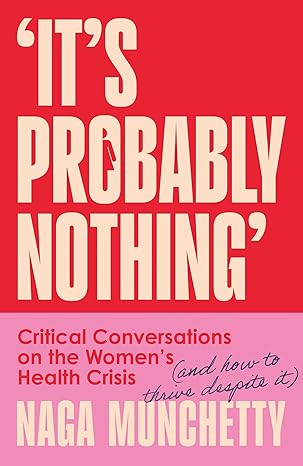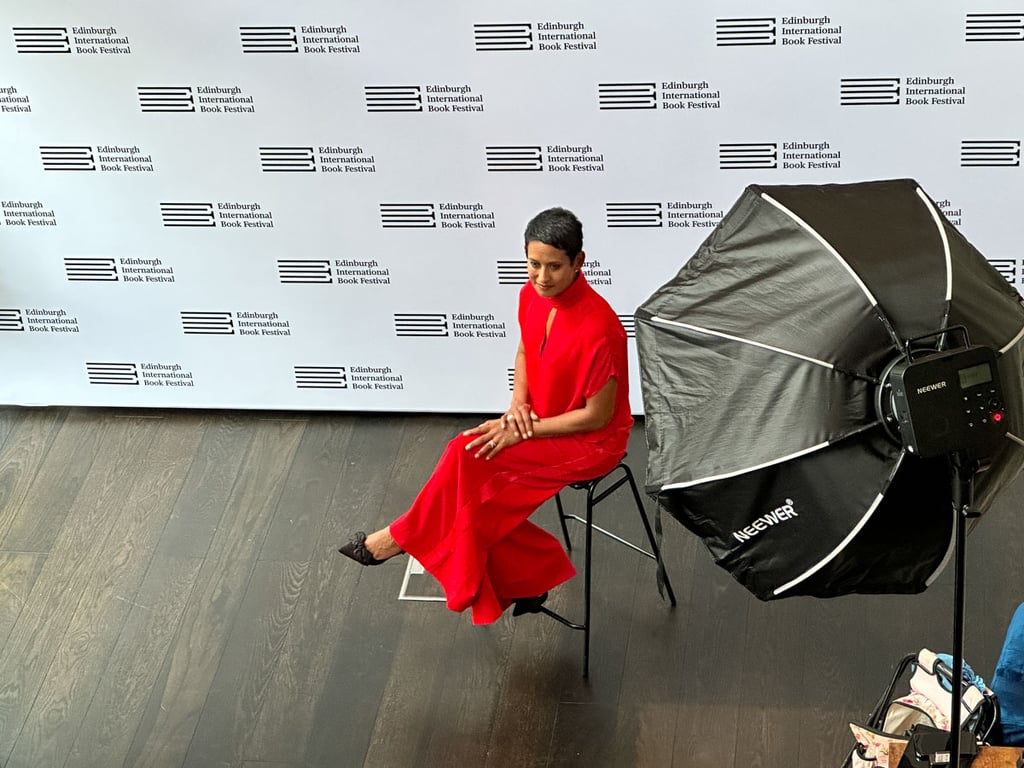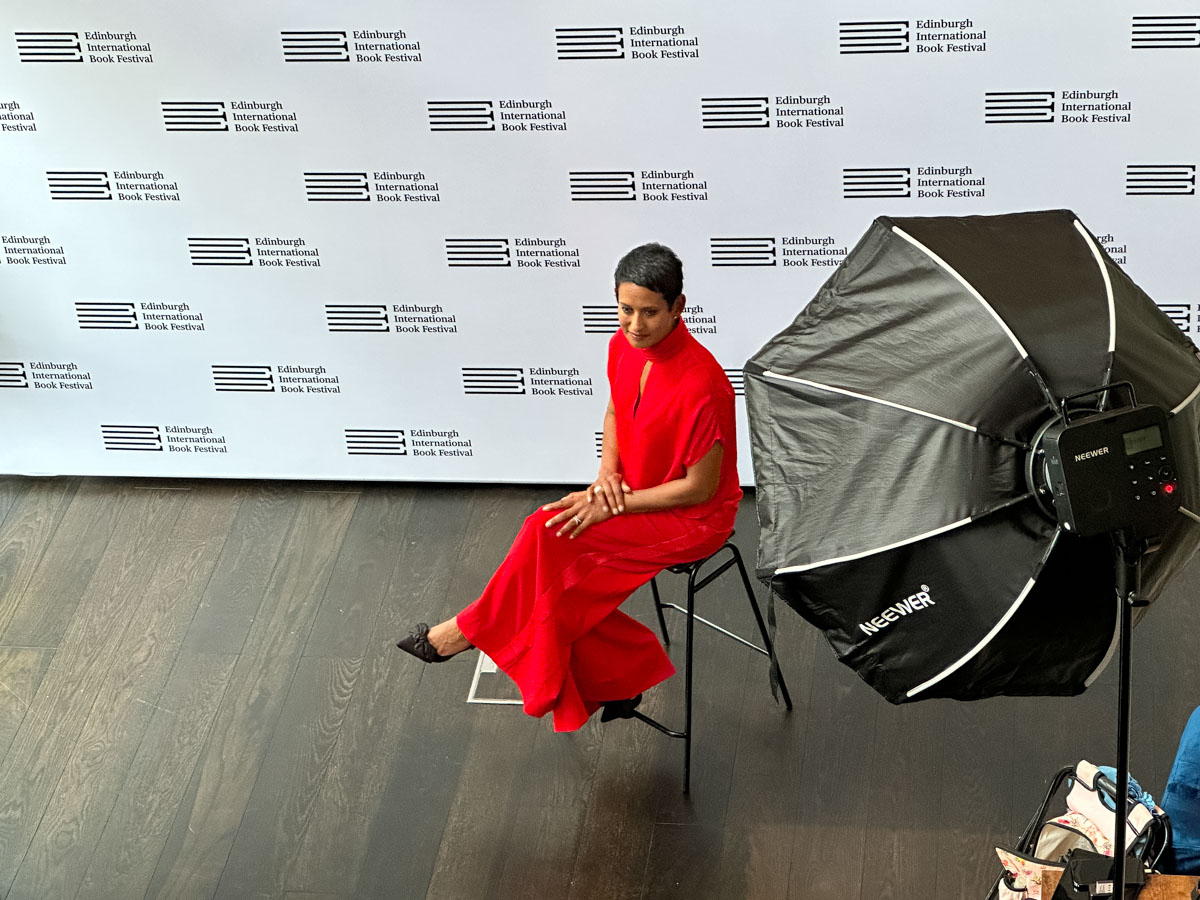Naga Munchetty is a journalist and broadcaster, known to millions as a presenter of BBC Breakfast and her own show on Radio 5.
But she’s not at the Edinburgh International Book Festival to talk about her career; she’s here to talk about her book ‘It’s Probably Nothing’: Critical Conversations on the Women’s Health Crisis (and How to Thrive Despite It) which focuses on the outrageous sidelining and belittling of women’s reproductive health problems, and what women can do to make their voices heard. The session is chaired by Devi Sridhar, Professor and Chair of Global Health at Edinburgh University.
It’s Probably Nothing includes the verbatim testimony of eighty women. Munchetty is adamant that the book is about them not her; her editor urged her to give more of herself, but her journalistic training has taught her to tell other people’s stories. She wrote the book to show women that they are not alone.

Munchetty’s first period brought with it flooding, diarrhoea and so much pain that she passed out. This became a three-weekly pattern. Doctors asked her no questions, simply telling her this was ‘normal’; one even asked her if she knew women had periods. She was by then 23 years old.
How, asks Sridhar, has she coped with all of this while doing such a high profile job?
Women just do, she replies. You get used to it, and eventually you stop asking questions. We’re expected to endure pain,
but we are more than just wombs on legs.
She was frequently told that her problems would be solved if she had a baby. The assumption, she says, is always that all women want to reproduce; she didn’t. Women who don’t want or are unable to get pregnant are seen as irrelevant and useless,
Not that we pay tax, of course! Or go shopping!
Munchetty is particularly scathing about governments around the world who, concerned about falling birth rates, tell women they have a duty to have children. Unless and until governments provide better childcare, financial support and career protection, children are simply not a viable option for many women, while men who take paternity leave are often seen as soft skivers.
People sometimes have to make a rational choice, she says, and she doesn’t think they’re currently offered a fair one. Governments want men and women in the workforce, and to be producing the next generation, but they do little to make that possible.
The system needs to enable women to be their whole selves and not just reproductive units.
Are female GPs, asks Sridhar, more sympathetic to women presenting with period problems? No, says Munchetty; while men have no experience of menstruation, a woman who’s never had problems has just as much trouble in understanding what it’s like for those who have.
In the end Munchetty herself turned to private health care, where she received a diagnosis of adenomyosis but was then told there was no cure, and that even the diagnosis could only be confirmed if she had a hysterectomy so that her uterus could be examined properly. Surgery would mean eight weeks off work,
Why should that be the only answer for a condition that affects up to one in eight women across the world?
Only 2.5% of medical research funding goes into women’s reproductive health issues.
It’s not ‘sexy medicine; there’s much more interest in developing treatments for erectile dysfunction because the results are visible!
The male contraceptive pill was never marketed, Munchetty says, because of its side effects; the numerous side effects of the female contraceptive pill are well known, but we are told they are acceptable. Women continue to take it because a failure of contraception will land firmly in their laps.
We are a society that does not recognise women’s roles at home or at work. I love men, but women’s roles are so undervalued.
Women who complain are labelled as hysterical or psychotic, at the very least they are ‘making people uncomfortable’ by talking about things they’d rather not hear. ‘Hystera’ is the ancient Greek word for womb; now ‘hysterical’ is equated with ‘psychotic’ and women are told ‘it’s all in your head.’
As the use of AI increases in medicine, will it, asks Sridhar, help? Perhaps predictably, it won’t. The bias fed into AI has, says Munchetty, come from the bias in the medical profession. Unless it changes, it will constantly make it more difficult for women to progress as they want to and should.
Sridhar cites Edinburgh University’s high percentage of female medical students, but Munchetty says this will make no difference until they are given better information from the outset. GPs have little training in gynaecology and women’s health, and they even have to opt in for that, ‘it’s disgusting and needs to change.’
Munchetty wants patients to take control of their own medical information, and advises them to research their symptoms on the internet – a practice that many doctors don’t like. There is so much misinformation out there, says Sridhar – Donald Trump told people to drink bleach, anti-vax advice is dangerous. Munchetty, however, thinks people should ‘go down that rabbit hole!’ – look it up, she says, then take your findings to a doctor and ask for their advice. It may be that you’ve found something they haven’t thought of, but if what you have found is unsafe, the doctor’s job is to explain why that is so, and to reassure you.
Don’t let anyone eye-roll you because you’ve taken control of your health. You should take responsibility for it and be helped to assess and analyse the information you find.
Women need to be ‘armed better’, to get information so that they can advocate for all women and make medical professionals listen. It’s not just about women either; men see their partners suffering and don’t know what to do. Her own husband phoned for an ambulance when she was lying on the floor screaming in pain. The ambulance never arrived, and when, 7 hours later, a paramedic called back their advice was simply to ‘take two paracetamol next time.’
Sridhar asks Munchetty about her own health; she runs, goes to the gym and plays a lot of golf, although she doesn’t think of the latter as good exercise,
It’s just a very leisurely walk, but at least you’re moving.
At 38 she ran (but did not enjoy) the London marathon, but it was concerns about osteoporosis that really galvanised her into taking her fitness seriously.
But I’m not particularly healthy; I’m one of the people who always lie when I got to the doctor.
(Doesn’t everyone?)
Is she bothered about aging? No she most certainly is not. She’s 50 now and doesn’t rule out cosmetic surgery, but she’s mainly just glad she’s still here when so many others are not.
Time for questions is lamentably short. The founder of several health-related charities says that they are great at giving the ‘you are not alone’ message to their members, but asks how can they get their wealth of lived experience out to the general public. Like it or not, Munchetty says, you need celebrity endorsement to amplify the message. The media gravitate towards high profile people; it’s the way of our 21st century world. Get someone famous on board and everyone’s interested.
The hour is over and Munchetty needs to get back to London. She’s a strong woman, one who wants to help the rest of us to stop taking the BS and demand the attention we deserve,
It’s not all “just hormones”!
We leave the room (‘the arena’ according to a staff member as she shepherds us out, and yes, it has all felt a bit like a rally at times) emboldened and ready for battle. In today’s short-staffed, cash-strapped NHS women need all the help they can get; ‘It’s Probably Nothing’ will empower them to demand what they need.
‘It’s Probably Nothing’: Critical Conversations on the Women’s Health Crisis (and How to Thrive Despite It) by Naga Munchetty is published by Thorsons. It is available in hardback, audiobook and e-book format.
 Naga Munchetty. Edinburgh International Book Festival. © 2025 Martin McAdam
Naga Munchetty. Edinburgh International Book Festival. © 2025 Martin McAdam
Like Loading…
Related
